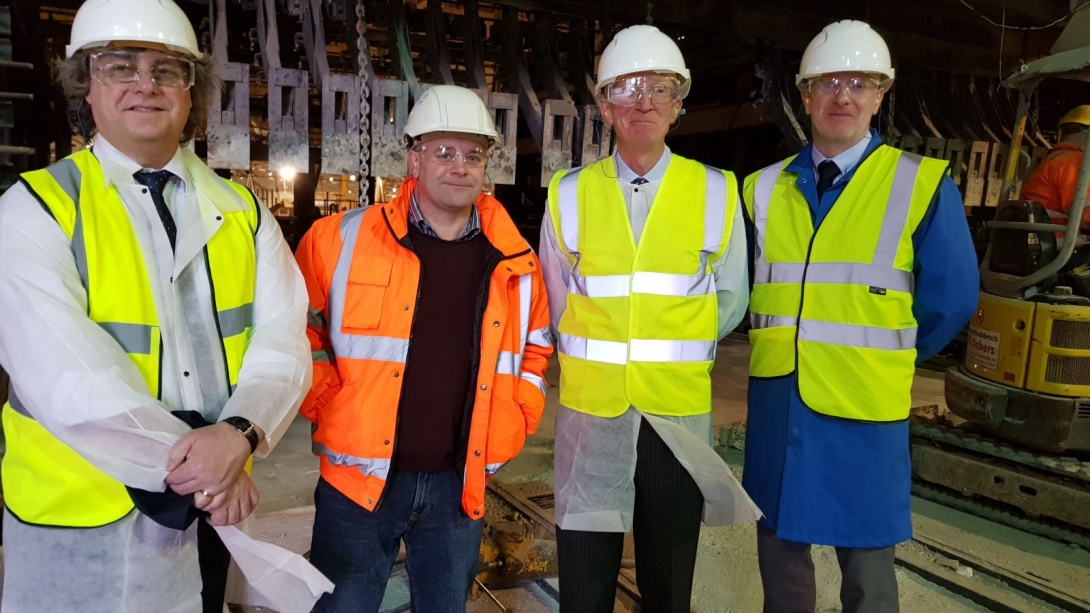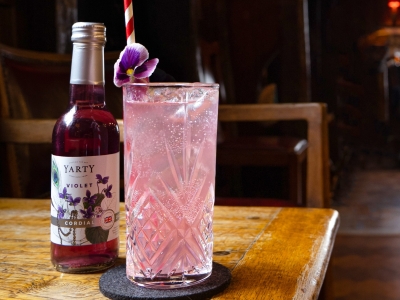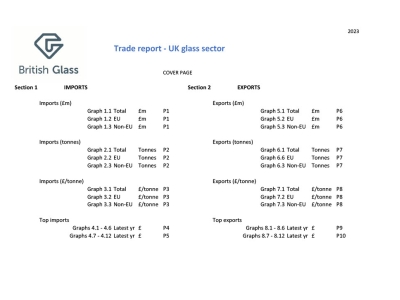
British Glass took Lord Prior and officials from the Department for Business, Energy and Industrial Strategy (BEIS) to see glass manufacturing in action yesterday – with site visits hosted by British Glass members Pilkington UK Ltd and Encirc. It was an opportunity to demonstrate all that glass has to offer the UK in building as sustainable manufacturing economy.
The tour of Pilkington’s Greengate site in St Helens allowed the visitors to see first-hand the technology, investment and expertise that underpin UK manufacture of flat glass – including high performance technical coatings that contribute to increasingly energy efficient buildings with good thermal insulation and control of heat gain from the sun.
Improvements in solar control and thermal insulation now mean that every tonne of CO2 invested in the manufacture of energy efficient glazing saves around 10 tonnes of CO2 through energy savings over the product’s lifetime.
This and key information about energy policy, plant investment and the likely landscape post-Brexit formed the basis of presentations and discussion following the tour.
Large scale flat, container and fibre glass manufacturing contributes around 6650 direct jobs and £1.3 billion to the UK economy each year. But 90% of this production comes from companies that are owned outside the UK – so UK sites must compete with others in their global groups for investment.
As the UK enacts its industrial strategy and works towards Brexit, British Glass is working with government at all levels, across departments, to ensure it recognises the importance of glass manufacturing and understands the factors that will determine the ongoing success of this sector.
British Glass technical director Dr Nick Kirk said:
“Glass capability is a vital economic and technological asset with a key role to play in the modern manufacturing economy. Much of twenty-first century life depends on products that use glass – from 100% recyclable packaging and energy-efficient glazing to optical technologies that enable anything from night vision to internet communication. That’s why we’re urging government to work with us to ensure the glass industry can plan, invest and grow successfully in the UK.”
After the visit to Pilkington UK Ltd, British Glass chief executive Dave Dalton took Lord Prior, formerly Parliamentary Under Secretary of State for BEIS, to visit Encirc’s glass container manufacturing site at Elton – which also provides filling, bonded warehouse and logistics services.
As the sustainability of packaging comes under increasing scrutiny, glass has much to offer. Glass is not only 100% recyclable, but glass packaging is already widely and simply recycled right across the UK. A UK manufactured wine bottle, for example, contains on average 68% recycled material.
At the Encirc plant Lord Prior saw at first-hand many examples of the measures that glass manufacturers are implementing as they work on implementing the UK Glass Sector Decarbonisation Action Plan.
Lord Prior will host a House of Lords launch event for Glass Futures on 7 February 2018. Glass Futures – originally conceived of by British Glass – will bring together experts from industry and academia to carry out research and large scale testing to enable glass manufacturing to reduce carbon emissions, decrease energy use, and explore alternative raw materials and energy sources. It will also provide a space to develop innovative products, for example in healthcare and defence applications.
Dave Dalton said:
“It is essential that we work closely with government to ensure that its strategies for industry, clean growth and resources enable glass manufacturing in the UK to deliver a sustainable and competitive future.”
Notes
British Glass helps the UK glass industry to have the influence, knowledge and skills to be world leading and globally competitive. It communicates the glass sector’s value and interests – as well as fostering collaboration and innovation – to secure a thriving, sustainable future for glass. Its membership includes companies from across the whole glass supply chain.
Glass Futures is a consortium venture with the backing of world-leading glass manufacturers, universities and suppliers to the glass sector. At the heart of the project will be a furnace capable of producing 30 tonnes of glass per day for research and development in process and product development.
Pilkington United Kingdom Limited, part of NSG Group, manufactures a wide range of float, coated, rolled, laminated and toughened glass products as well as its own range of high-performance insulating glass units. Glass is distributed direct to customers, either as stock or as bespoke processed products to meet their needs, either direct from St Helens or through its network of branches countrywide. The company is highly focused on quality and service, continually improving to deliver the benefits of the NSG Group's technical ability and innovation to the end user.
Encirc is a market leader in glass container design, manufacturing, bottling and logistics solutions for the UK and Irish food and beverage industries. With more than 1,200 employees, it operates from its purpose-built sites in Derrylin, Co Fermanagh, Northern Ireland and Elton, Cheshire. The company produces more than 2.5 billion glass bottles and other containers annually, and can fill up to 250 million litres of bulk shipped beverages every year.


